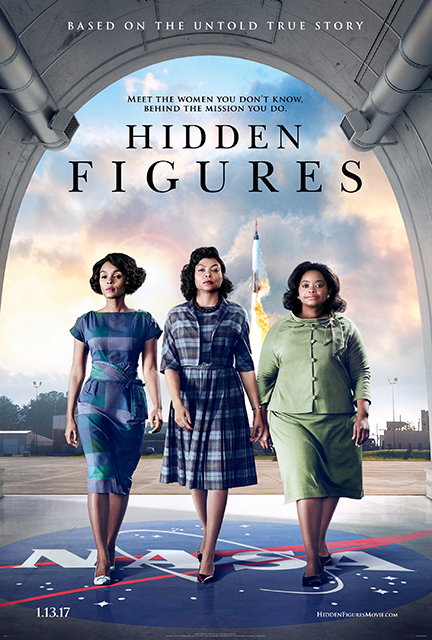By John Liu
NORTHWEST ASIAN WEEKLY

![]()
![]()
![]()
![]()
For the last few months, you may have seen previews for a comedy biopic based on the book, Hidden Figures, written Margot Lee Shetterly. Three exceptional African American women made significant contributions to the U.S. space program that led to John Glenn completing a suborbital trip around Earth and the first moon landing. Katherine Johnson, portrayed by Taraji P. Henson, is the main protagonist.
She is a mathematical genius and serves as a “computer” for NASA. In the 1940s, computers had not been invented yet, so a group of female scientists and mathematicians were hired to do computations to free engineers for higher priority tasks. There was a subgroup of African American women, known as West computers, who were not only some of the best and brightest, but also had to traverse the challenges of segregation. Surprisingly, on historyvshollywood.com, Katherine Johnson explained that although there were segregation laws, its effects were largely felt outside of NASA. She was treated respectfully by her peers.
Hidden Figures also follows the lives of Mary Jackson, played by Janelle Monáe, who strives to be the first female African American aerospace engineer at NASA, and Dorothy Vaughan, played by Octavia Spencer, who oversees the “computer” division and constantly working for her promotion to supervisor.
Katherine, Mary, and Dorothy navigate their way through NASA and segregation laws, while never letting go of their dreams.
Near the end of the movie, John Glenn asks Katherine Johnson for a big favor right before the rocket launch. I won’t spoil what he asks. However, at the moment I thought the movie was trying to shoehorn one last feel-good moment in the film. But after doing some research, it turns out it was real. There is some debate as to the actual time this favor was asked, since there were a bunch of false starts before the actual launch. Sadly, John Glenn passed away on Dec. 8 before he was able to see Hidden Figures, but I’m sure he would be satisfied with his portrayal in the movie.
You’d be surprised that the soundtrack was handled by famous musicians, including Pharrell Williams (also producer), Hans Zimmer, and Benjamin Wallfisch. Kim Burrell, a pastor and gospel choir singer, also contributed with her song “I See a Victory,” but was met with controversy shortly before the movie was released. A video of Kim surfaced on the internet with her delivering a hateful homophobic speech. Since Hidden Figures was about inclusion, Kim’s remarks muddied up the message of the movie, and the cast and crew distanced themselves from her.
According to variety.com, Hidden Figures played well with all audiences. Studio data shows females represented 64 percent of the audience, African Americans represented 37 percent. The comedy elements and great cast really helped distinguish this film from other biopics this year.
Hidden Figures sold a leading $20.5 million in tickets in North American theaters over the Martin Luther King Jr. Day holiday weekend, according to estimates on Jan. 15.
Fox anticipates the film will make $25.3 million when Jan. 16 tickets sales are included, bringing its cumulative total to about $60 million.
Hidden Figures is currently showing at your local theaters.
John can be reached at john@nwasianweekly.com.



